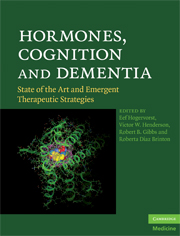Book contents
- Hormones, Cognition and Dementia
- Hormones, Cognition and Dementia
- Copyright page
- Contents
- Contributors
- Preface
- Section 1 Estrogens and cognition: perspectives and opportunities in the wake of the Women's Health Initiative Memory Study
- Section 2 Varieties of estrogenic therapy
- Section 3 Potential modulators and modifiers of estrogenic effects
- Section 4 Possible genetic factors related to hormone treatment effects
- Section 5 Testosterone, estradiol and men, and sex hormone binding globulin
- Chapter 19 Androgens and cognitive functioning in women
- Chapter 20 The role of estradiol in testosterone treatment
- Chapter 21 Endogenous testosterone levels and cognitive aging in men
- Chapter 22 Clinical trials and neuroimaging studies of testosterone in men: insights into effects on verbal memory
- Chapter 23 Testosterone therapy and Alzheimer's disease: potential for treatment and prevention in women
- Chapter 24 Endogenous estradiol and dementia in elderly men: the roles of vascular risk, sex hormone binding globulin, and aromatase activity
- Chapter 25 Testosterone regulates Alzheimer's disease pathogenesis
- Section 6 Gonadotropin effects
- Index
- Plate Section
Chapter 21 - Endogenous testosterone levels and cognitive aging in men
from Section 5 - Testosterone, estradiol and men, and sex hormone binding globulin
Published online by Cambridge University Press: 06 July 2010
- Hormones, Cognition and Dementia
- Hormones, Cognition and Dementia
- Copyright page
- Contents
- Contributors
- Preface
- Section 1 Estrogens and cognition: perspectives and opportunities in the wake of the Women's Health Initiative Memory Study
- Section 2 Varieties of estrogenic therapy
- Section 3 Potential modulators and modifiers of estrogenic effects
- Section 4 Possible genetic factors related to hormone treatment effects
- Section 5 Testosterone, estradiol and men, and sex hormone binding globulin
- Chapter 19 Androgens and cognitive functioning in women
- Chapter 20 The role of estradiol in testosterone treatment
- Chapter 21 Endogenous testosterone levels and cognitive aging in men
- Chapter 22 Clinical trials and neuroimaging studies of testosterone in men: insights into effects on verbal memory
- Chapter 23 Testosterone therapy and Alzheimer's disease: potential for treatment and prevention in women
- Chapter 24 Endogenous estradiol and dementia in elderly men: the roles of vascular risk, sex hormone binding globulin, and aromatase activity
- Chapter 25 Testosterone regulates Alzheimer's disease pathogenesis
- Section 6 Gonadotropin effects
- Index
- Plate Section
Summary
In this chapter, Moffat reviews observational research in older men that examines serum testosterone concentrations in relation to cognitive aging or Alzheimer's disease (AD) risk. Prospective cohort studies, such as the Baltimore Longitudinal Study of Aging, provide particularly useful data. Despite methodological limitations and conflicting findings, Moffat tentatively concludes that age-associated reductions in testosterone concentrations are a risk factor for cognitive decline and dementia. Cognitive vulnerability may be limited to specific domains of cognitive performance and may be modified by apolipoprotein E genotype. As he suggests, more definitive answers may require well designed randomized clinical trials that target cognitive effects of testosterone therapy. Any future trial must also consider other health outcomes that may be beneficially or adversely affected by testosterone.
Information
- Type
- Chapter
- Information
- Hormones, Cognition and DementiaState of the Art and Emergent Therapeutic Strategies, pp. 197 - 207Publisher: Cambridge University PressPrint publication year: 2009
